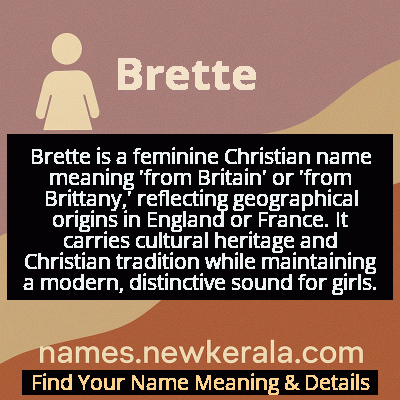Brette Name Meaning & Details
Origin, Popularity, Numerology Analysis & Name Meaning of Brette
Discover the origin, meaning, and cultural significance of the name BRETTE. Delve into its historical roots and explore the lasting impact it has had on communities and traditions.
Name
Brette
Gender
Female
Origin
Christian
Lucky Number
7
Meaning of the Name - Brette
Brette is a feminine Christian name meaning 'from Britain' or 'from Brittany,' reflecting geographical origins in England or France. It carries cultural heritage and Christian tradition while maintaining a modern, distinctive sound for girls.
Brette - Complete Numerology Analysis
Your Numerology Number
Based on Pythagorean Numerology System
Ruling Planet
Neptune (Ketu)
Positive Nature
Intuitive, analytical, spiritual, and inquisitive.
Negative Traits
Secretive, reserved, aloof, and can be overly critical.
Lucky Colours
Green, yellow.
Lucky Days
Monday.
Lucky Stones
Cat’s eye, moonstone.
Harmony Numbers
1, 5, 6.
Best Suited Professions
Scientists, researchers, spiritual leaders, detectives.
What People Like About You
Depth of knowledge, analytical skills, spirituality.
Famous People Named Brette
Brette Poirier
Actress
Known for her roles in independent films and television series
Brette Harrington
Professional Rock Climber
Renowned alpinist and free solo climber known for groundbreaking ascents
Brette Benedict
Artist and Designer
Influential textile artist and surface pattern designer
Name Variations & International Equivalents
Click on blue names to explore their detailed meanings. Gray names with will be available soon.
Cultural & Historical Significance
The name's Christian significance is deeply rooted in the missionary history of Britain and Brittany, where early Christian saints established churches and monasteries. This religious connection gives Brette a spiritual dimension beyond its geographical meaning, linking it to centuries of Christian tradition in Western Europe. The name's endurance through various historical periods demonstrates its cultural resilience and ongoing relevance as a marker of identity that honors both personal faith and cultural heritage.
Extended Personality Analysis
Individuals named Brette are often perceived as strong-willed, independent, and culturally aware. They typically exhibit a blend of traditional values and modern thinking, reflecting the name's dual heritage. Bretten tend to be natural leaders with excellent communication skills and a diplomatic approach to conflict resolution. Their personality often combines the practicality associated with British culture and the artistic sensibility linked to French heritage. Many Bretten demonstrate adaptability and resilience, able to navigate different social situations with grace and confidence.
Bretten are often drawn to creative pursuits, travel, and cultural exploration, with a natural curiosity about their own heritage and the world around them. Their strong sense of identity and cultural roots gives them a grounded perspective while maintaining an open-minded approach to new experiences and people. In social settings, they're known for their warmth and ability to connect with diverse individuals, making them excellent bridge-builders between different groups. Their Christian background often manifests in strong moral compass and community-oriented values, though they typically express their faith through practical action rather than dogma. The combination of strength and sensitivity in their personality makes them both reliable friends and inspiring leaders.
Modern Usage & Popularity
In contemporary times, Brette remains a relatively uncommon but distinctive choice for girls, appealing to parents seeking a name that is both traditional and unique. The name has maintained steady but low usage in English-speaking countries, particularly among families with British or French heritage. Recent years have seen a slight increase in popularity as parents look for names that are gender-specific yet strong, moving away from unisex names. Brette fits well with modern naming trends that favor short, crisp names with historical depth and cultural significance. It's particularly popular in cosmopolitan areas and among families who value European heritage and cross-cultural connections, while its Christian associations continue to make it appealing to religious families seeking meaningful but not overtly biblical names.
Symbolic & Spiritual Meanings
Symbolically, Brette represents bridges between cultures, strength in femininity, and deep-rooted identity. The name evokes images of coastal strength and cultural crossroads, symbolizing someone who can navigate different worlds while maintaining their core identity. It carries connotations of heritage preservation and cultural diplomacy, representing individuals who honor tradition while embracing progress. The feminine ending on a traditionally masculine-rooted name symbolizes the empowerment of women to claim strong, historically significant names. Brette also symbolizes connection to land and ancestry, serving as a living link to geographical and cultural origins while allowing for individual interpretation and modern identity formation, making it a powerful symbolic choice that balances historical weight with contemporary relevance.

